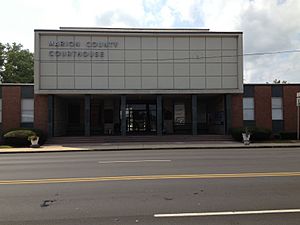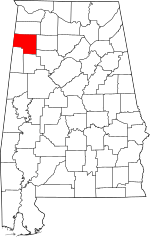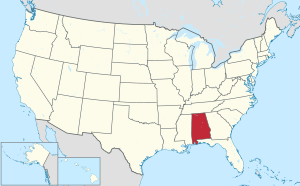Marion County, Alabama facts for kids
Quick facts for kids
Marion County
|
|
|---|---|

Marion County Courthouse in Hamilton
|
|

Location within the U.S. state of Alabama
|
|
 Alabama's location within the U.S. |
|
| Country | |
| State | |
| Founded | February 13, 1818 |
| Named for | Francis Marion |
| Seat | Hamilton |
| Largest city | Hamilton |
| Area | |
| • Total | 744 sq mi (1,930 km2) |
| • Land | 742 sq mi (1,920 km2) |
| • Water | 1.3 sq mi (3 km2) 0.2% |
| Population
(2020)
|
|
| • Total | 29,341 |
| • Estimate
(2023)
|
29,244 |
| • Density | 39.437/sq mi (15.227/km2) |
| Time zone | UTC−6 (Central) |
| • Summer (DST) | UTC−5 (CDT) |
| Congressional district | 4th |
|
|
Marion County is a county in the state of Alabama, United States. In 2020, about 29,341 people lived here. The main town and county seat is Hamilton. The county was started on February 13, 1818. It was named after General Francis Marion, a hero from the American Revolutionary War.
Marion County is in the northwest part of Alabama. It shares a border with Mississippi to the west. The county covers about 743 square miles (1,924 square kilometers). In most of Marion County, selling alcohol is not allowed. However, you can buy alcohol in the cities of Guin, Hamilton, and Winfield.
Contents
History of Marion County
Marion County was created on February 13, 1818. This was almost two years before Alabama became a state. The land came from the Chickasaw Native American tribe. At first, Marion County was much larger. It included parts of what are now other counties in Alabama and Mississippi.
The county was named after General Francis Marion. He was a famous soldier from South Carolina. People called him "The Swamp Fox" because of his clever fighting style. Many early settlers moved here from Kentucky and Tennessee. They came after General Andrew Jackson built the Military Road. Some of the first towns were Pikeville, Hamilton, Winfield, and Guin.
The first county seat was in Cotton Gin Port in 1818. It moved a few times before settling in Pikeville in 1820. Pikeville was the county seat until 1882. Today, Pikeville is a ghost town, meaning it's mostly abandoned. In 1882, Hamilton became the new county seat. The first courthouse in Hamilton burned down in 1887. A new one was built, but it also burned. The current courthouse was built in 1901. It was updated in 1959 with a modern design.
Geography of Marion County
Marion County covers about 744 square miles (1,927 square kilometers). Most of this area is land. Only a small part is water.
Neighboring Counties
Marion County is next to these other counties:
- Franklin County (north)
- Winston County (east)
- Walker County (southeast)
- Fayette County (south)
- Lamar County (southwest)
- Monroe County, Mississippi (southwest)
- Itawamba County, Mississippi (west)
Population Information
| Historical population | |||
|---|---|---|---|
| Census | Pop. | %± | |
| 1830 | 4,058 | — | |
| 1840 | 5,847 | 44.1% | |
| 1850 | 7,833 | 34.0% | |
| 1860 | 11,182 | 42.8% | |
| 1870 | 6,059 | −45.8% | |
| 1880 | 9,364 | 54.5% | |
| 1890 | 11,347 | 21.2% | |
| 1900 | 14,494 | 27.7% | |
| 1910 | 17,495 | 20.7% | |
| 1920 | 22,008 | 25.8% | |
| 1930 | 25,967 | 18.0% | |
| 1940 | 28,776 | 10.8% | |
| 1950 | 27,264 | −5.3% | |
| 1960 | 21,837 | −19.9% | |
| 1970 | 23,788 | 8.9% | |
| 1980 | 30,041 | 26.3% | |
| 1990 | 29,830 | −0.7% | |
| 2000 | 31,214 | 4.6% | |
| 2010 | 30,776 | −1.4% | |
| 2020 | 29,341 | −4.7% | |
| 2023 (est.) | 29,244 | −5.0% | |
| U.S. Decennial Census 1790–1960 1900–1990 1990–2000 2010–2020 |
|||
In 2020, the population of Marion County was 29,341 people. There were about 11,997 households. Most people living in the county were White (88.93%). About 3.73% were Black or African American. About 2.94% of the population was Hispanic or Latino.
In 2010, the population was 30,776. The average age was 42.8 years old. About 21.7% of the people were under 18. The median household income was $32,769. This means half of the households earned more, and half earned less. About 17.8% of the population lived below the poverty line.
Education in Marion County
Marion County has two public school systems. They are Marion County Schools and Winfield City Schools. Hamilton is also home to a campus of Bevill State Community College.
Marion County School System
- Philips Elementary and High School (Bear Creek)
- Brilliant Elementary School
- Brilliant High School
- Guin Elementary School
- Marion County High School (Guin)
- Hackleburg Elementary and High School
- Hamilton Elementary School
- Hamilton Middle School
- Hamilton High School
Winfield City School System
- Winfield Elementary School
- Winfield Middle School
- Winfield High School
Local Events
Marion County hosts several fun events throughout the year:
- Jerry Brown Arts Festival - Hamilton (March)
- Neighbor Day - Hackleburg (Last Saturday in April)
- MayFest - Guin (Second Saturday in May)
- CoalFest - Brilliant (Memorial Day)
- Mule Day - Winfield (September)
- Buttahatchee River Fall Fest - Hamilton (October)
Transportation
Major Highways
 Interstate 22
Interstate 22 U.S. Highway 43
U.S. Highway 43 U.S. Highway 78
U.S. Highway 78 U.S. Highway 278
U.S. Highway 278 State Route 13
State Route 13 State Route 17
State Route 17 State Route 19
State Route 19 State Route 44
State Route 44 State Route 74
State Route 74 State Route 129
State Route 129
Railroads
- BNSF Railway
- Norfolk Southern Railway
Airport
- Marion County-Rankin Fite Airport
Communities
Cities
- Guin
- Haleyville (mostly in Winston County)
- Hamilton (county seat)
- Winfield (partly in Fayette County)
Towns
- Bear Creek
- Brilliant
- Glen Allen (partly in Fayette County)
- Gu-Win (partly in Fayette County)
- Hackleburg
- Twin
Other Communities
These are smaller, unincorporated communities:
Ghost Town
Images for kids
See also
 In Spanish: Condado de Marion (Alabama) para niños
In Spanish: Condado de Marion (Alabama) para niños


